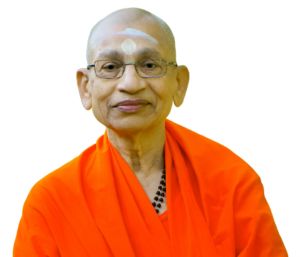
Spiritual Discourses: Recognise that what you really seek is īśvara
Swami Viditatmananda Saraswati*
Na Me Bhaktaḥ Praṇaśyati – 06
Recognise that what you really seek is īśvara. This change of the locus of devotion happens by understanding. That is why it is important to understand what bhagavān, the Lord, is and where the bhakta, the devotee, is coming from. If we recognise that what we are really seeking in life is īśvara, we are already devotees of īśvara.
Sat-cit-ānanda is what we want. Sat means existence or immortality. We are trying to push death away, hoping that we can become immortal. You can’t make the body immortal; it is a futile effort. You can push death away, but the body cannot become immortal. Cit means wisdom or knowledge. We are trying to become infinitely knowledgeable by packing everything into the brain, but nobody can know everything. We want to experience only ānanda, happiness, but that cannot happen as long as our understanding is incorrect.
The only correct understanding is that I happen to be sat-cit- ānanda. Knowledge of what I am can ultimately make me achieve the goal of limitless happiness. The actor who thinks he is a beggar does not have to do anything except to know the truth about who he is. Because of ignorance, he takes himself to be a beggar. By knowledge, he can be a wealthy person again.
Devotion culminates in this knowledge of the truth, that I am the limitless happiness that I seek. Right understanding creates devotion to īśvara and that devotion culminates in knowledge. The bhakta that Lord Krishna refers to is the one in whom the right understanding has come. We are all basically devotees, but the focus of devotion changes when our understanding changes.
When Lord Krishna says, “sādhureva sa mantavyaḥ samyagvyavasito hi saḥ,”1 he describes how a person gets transformed when his conviction changes, “he is to be considered a good person because he has resolved rightly.” Even though he might have been a durācārī conducting himself in an evil manner, when the person’s conviction changes, the person gets transformed. He was a sinner all this time because of his wrong understanding. A person is not a sinner by nature; rather it is his understanding that has made him so. Because of some distortion in his mind, he thinks that what he is doing is acceptable. Therefore, it is the understanding and the conviction arising from it that is wrong. If the understanding changes, the conviction changes, and the person also changes.
This person now has the right conviction. Soon he becomes a sādhu, a dharmātmā, a person of good conduct. He becomes a saint and becomes liberated. Just conviction alone has this much power and importance. This clarity of conviction is devotion.
Worldly achievement cannot give real satisfaction
Lord Krishna also uses the word “conviction” in the second chapter of the Bhagavad Gita, where he says, vyavasāyātmikā buddhiḥ ekeha kurunandana1. He says, “Kurunandana, O Arjuna; iha, here on the path of mokṣa, liberation, freedom; the vyavasāyātmikā buddhiḥ, the conviction; is eka, one and consistent.”
At every moment we have conviction about what we want and how to achieve it. That is what enables us to carry out a particular effort and accomplish the goal. The problem is that, having accomplished the goal, we discover that it is not quite what we wanted, and now we want something else. Regardless of what it is that we accomplish, we never feel that we have gotten what it is that we were really seeking.
What the human being is seeking is to be totally free. We want to be limitless. We want to be whole and complete. That is the desire with which we were born. There is no choice; we have no choice to settle for something limited because our hearts cannot settle for anything limited. It may settle for a little while when the desire is fulfilled, but that feeling does not last very long. Desire just waits for a time when we discover that what we have is not quite what we want; then the conviction changes and we aim for something else.
Thus, in our life, the conviction for the goal and the path to the goal keeps on changing. We are not clear about what our heart is urging us to do and we are not clear about what we really want in life. My problem is that I am a self, or an “I,” that is wanting, lacking, inadequate, and limited. This wanting, lacking “I” is a problem for myself. Really speaking, I am constantly trying to become free from the “I” that is wanting and lacking. What I want is an “I” or self that is free from all lack and want. This is the reality of life.
Most people, most of the time, do not take the time to really look into what it is that they are seeking in life. Most people do not have that insight, so life goes on and gets over. A second life comes and that also gets over. But eventually, that insight does arise, by the grace of īśvara and the grace of the teacher, as a result of the fructification of many puṇya-karmas. We can say because of “good luck” or we can say because of the grace of īśvara, the insight does arise that these worldly achievements cannot really give me sustained or lasting satisfaction. The lasting satisfaction that I am seeking cannot be attained from any of these things anywhere.
Change your pursuit from achieving to knowing
In the Muṇḍaka Upaniṣad it is said, “parīkṣya lokān karmacitān brāhmaṇo nirvedamāyānnāstyakṛtaḥ kṛtena. When a brāhmaṇa, a contemplative person; parikṣya lokān, deliberates upon what he has achieved and what is possible to achieve in the world; nirvedamāyāt, he gets disillusioned with what he has been doing. Nāstyakṛtaḥ kṛtena, he sees that akṛtaḥ, what I am seeking, which is lasting and eternal, cannot be kṛtena, created by effort.”
I am seeking lasting satisfaction, happiness that will never end. The rule is that what is lasting must be something that does not end. Another rule is that whatever is created will end someday. Therefore, if I want happiness that does not end, then that can only be happiness that also is not created. We keep on creating happiness and discovering that it ends. Therefore, happiness or satisfaction that does not end must not have been created.
“Created” refers to something that did not exist and then came into being. Akṛtaḥ, uncreated, is that which does not come into being, meaning that it always exists. It must exist right now. Maybe I am not looking at it. Maybe my mind is distracted. Maybe I am searching in all sorts of places but not looking where it is.
The Upaniṣad says Nāstyakṛtaḥ kṛtena, this contemplative person discovers that the akṛtaḥ, the uncreated, everlasting, and eternal, cannot be attained. Whatever is attained is always limited. Thus, from being a seeker of what he does not have, he becomes a seeker of knowing what he has. “Tad vijñānārthaṁ sa gurumevābhigacchet,1 to know that eternal, he should go to a teacher.” The whole thing transforms from the pursuit of achievement to the pursuit of knowing.
This kind of transformation happened to Arjuna. When he entered the battlefield, he also was a person who wanted to achieve something. He wanted victory, kingdom, power, and so on. Then, when he saw friends and relatives arrayed on both sides of the battle line, all of a sudden he became very sad. In that state of mind, he started deliberating. He was trying to find valid reasons for why he should not fight the battle. In that process of deliberation, he said to Lord Krishna, “Even if I get the unrivalled, prosperous kingdom of the entire earth, even if you make me lord of the heavens, even that achievement cannot remove the sense of inadequacy and suffering that comes from that.”1 He could not imagine any accomplishment that could remove the sorrow he was experiencing. Therefore, he asked Lord Krishna to please teach him.
From a person who wanted to achieve something, Arjuna became a person who wanted to know. A mumukṣu became a jijñāsu. Mumukṣu means a seeker of mokṣa, the eternal happiness that everyone is. From that, one becomes a jijñāsu, one who desires knowledge of that eternal self. That is the transformation. Now the conviction has changed. When the conviction has changed, the direction changes and he becomes a seeker of knowledge. He has thevyavasāyātmikā buddhiḥ, the conviction, which is eka, one and consistent. Lord Krishna talks about vyavasāya, conviction, in the context of knowledge in the second chapter and again uses the same word, vyvasita,2 in the context of bhakti, devotion, in the ninth chapter.
Only knowing īśvara can satisfy your real desire
The transformation to bhakta, devotee, begins when the person discovers that we are bhaktas always. We are all born bhaktas, devotees. Every moment, each one of us worships something. What is that something? It is whatever we consider to be the most important at that moment. We are automatically devoted to that. It is the nature of the mind to have a judgement and conclusion every moment about what it wants and how it will get it. All accomplishments that human beings have achieved, such as going to the North Pole, South Pole, scaling Everest, going beneath the sea, or going to the moon, have all been achieved due to conviction.
From being a devotee of other things, I transform into a devotee of īśvara only when the understanding arises that what I really want is freedom from all wants and that only by knowing īśvara can I attain what I really seek. Therefore, the person we call a sinner is a just person who has a wrong conviction.
There is no such person as a sinner or a criminal. There is only a person who is given to criminality, meaning that the person can change. When we call a person a criminal, we have concluded that it is his nature to be a criminal and that he will never change. But he can change because the person is not a criminal by nature. He is a person who has a wrong understanding of what he is seeking and the means to achieve that end. He adopts means that he thinks are right means according to his standpoint. Even that person will be a changed person if his conviction changes. Anybody can change when the conviction changes.
We cannot change anybody unless the person himself or herself desires to change. The point is that the person should decide to change. That happens when he has the conviction. The conviction arises from an understanding of life. The conviction arises from understanding that Bhagavān, īśvara, alone deserves to be the goal of my life; nothing else deserves to be the goal of my life.
People give different definitions of God, depending on what they value the most. One person wants love, another wants truth, and someone else wants knowledge, or something else. But I become a devotee of īśvara when I realize that if I want love, īśvara is love; if I want truth, īśvara is truth; if I want knowledge, īśvara is knowledge. I am already a devotee of love or truth or knowledge. But when I understand that knowledge means īśvara; truth means īśvara; and love means īśvara, then automatically I become a devotee of īśvara. It is my understanding that creates the conviction.
-to be continued…
*Swami Viditatmananda Saraswati has been teaching Vedānta Prasthānatrayī and Prakaraṇagranthas for the last 40 years in Ahmedabad, Gujarat. Throughout the year, he conducts daily Vedānta discourses, accompanied by retreats, and Jñāna Yajñas on Vedānta in different cities in India and foreign countries.






